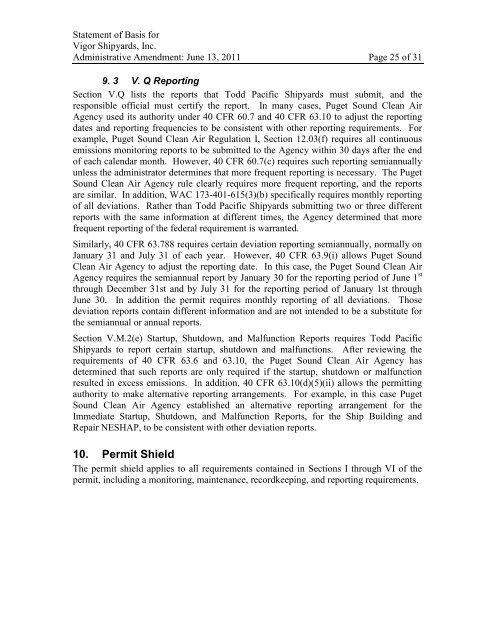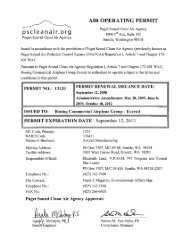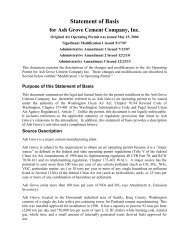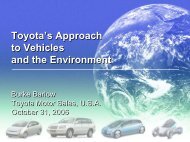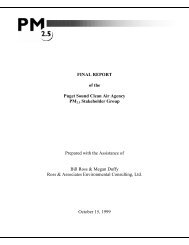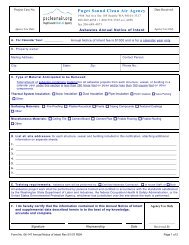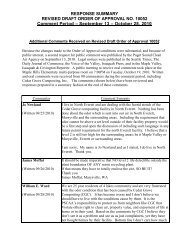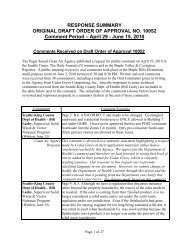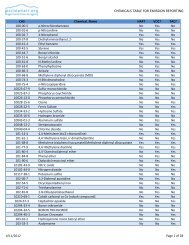Statement of Basis Vigor Shipyards Inc. - Puget Sound Clean Air ...
Statement of Basis Vigor Shipyards Inc. - Puget Sound Clean Air ...
Statement of Basis Vigor Shipyards Inc. - Puget Sound Clean Air ...
You also want an ePaper? Increase the reach of your titles
YUMPU automatically turns print PDFs into web optimized ePapers that Google loves.
<strong>Statement</strong> <strong>of</strong> <strong>Basis</strong> for<strong>Vigor</strong> <strong>Shipyards</strong>, <strong>Inc</strong>.Administrative Amendment: June 13, 2011 Page 25 <strong>of</strong> 319. 3 V. Q ReportingSection V.Q lists the reports that Todd Pacific <strong>Shipyards</strong> must submit, and theresponsible <strong>of</strong>ficial must certify the report. In many cases, <strong>Puget</strong> <strong>Sound</strong> <strong>Clean</strong> <strong>Air</strong>Agency used its authority under 40 CFR 60.7 and 40 CFR 63.10 to adjust the reportingdates and reporting frequencies to be consistent with other reporting requirements. Forexample, <strong>Puget</strong> <strong>Sound</strong> <strong>Clean</strong> <strong>Air</strong> Regulation I, Section 12.03(f) requires all continuousemissions monitoring reports to be submitted to the Agency within 30 days after the end<strong>of</strong> each calendar month. However, 40 CFR 60.7(c) requires such reporting semiannuallyunless the administrator determines that more frequent reporting is necessary. The <strong>Puget</strong><strong>Sound</strong> <strong>Clean</strong> <strong>Air</strong> Agency rule clearly requires more frequent reporting, and the reportsare similar. In addition, WAC 173-401-615(3)(b) specifically requires monthly reporting<strong>of</strong> all deviations. Rather than Todd Pacific <strong>Shipyards</strong> submitting two or three differentreports with the same information at different times, the Agency determined that morefrequent reporting <strong>of</strong> the federal requirement is warranted.Similarly, 40 CFR 63.788 requires certain deviation reporting semiannually, normally onJanuary 31 and July 31 <strong>of</strong> each year. However, 40 CFR 63.9(i) allows <strong>Puget</strong> <strong>Sound</strong><strong>Clean</strong> <strong>Air</strong> Agency to adjust the reporting date. In this case, the <strong>Puget</strong> <strong>Sound</strong> <strong>Clean</strong> <strong>Air</strong>Agency requires the semiannual report by January 30 for the reporting period <strong>of</strong> June 1 stthrough December 31st and by July 31 for the reporting period <strong>of</strong> January 1st throughJune 30. In addition the permit requires monthly reporting <strong>of</strong> all deviations. Thosedeviation reports contain different information and are not intended to be a substitute forthe semiannual or annual reports.Section V.M.2(e) Startup, Shutdown, and Malfunction Reports requires Todd Pacific<strong>Shipyards</strong> to report certain startup, shutdown and malfunctions. After reviewing therequirements <strong>of</strong> 40 CFR 63.6 and 63.10, the <strong>Puget</strong> <strong>Sound</strong> <strong>Clean</strong> <strong>Air</strong> Agency hasdetermined that such reports are only required if the startup, shutdown or malfunctionresulted in excess emissions. In addition, 40 CFR 63.10(d)(5)(ii) allows the permittingauthority to make alternative reporting arrangements. For example, in this case <strong>Puget</strong><strong>Sound</strong> <strong>Clean</strong> <strong>Air</strong> Agency established an alternative reporting arrangement for theImmediate Startup, Shutdown, and Malfunction Reports, for the Ship Building andRepair NESHAP, to be consistent with other deviation reports.10. Permit ShieldThe permit shield applies to all requirements contained in Sections I through VI <strong>of</strong> thepermit, including a monitoring, maintenance, recordkeeping, and reporting requirements.


